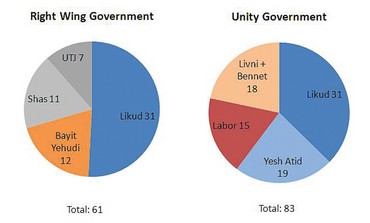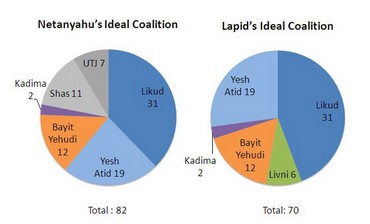Israeli coalition
Here's a novel idea, Yair Lapid is Israel's Barack Obama. Yair Lapid is a moderate, middle class, centrist, whose father Tommy Lapid was a reporter and a secular politician who openly disliked the ultra-orthodox. Yair takes after him, but is not so abrasive, and his new party Yesh Atid (there is a future) jumped to the second place in the recent election (19 seats) by using the catch word (you got it ) - "change." Yair Lapid is young(ish), good looking, has charisma, was a TV anchor and knows how to present himself.
How did he gain more seats than the other centrist/leftist parties, such as Kadima, Hatnuah, and Labor, all of which also emphasized the economic situation and favored domestic issues? All the others are made up of old style politicians, Shelly Yacimovich of Labor is head of a party that the voters are apparently fed up with, it was the largest party here for many years, but is now down to 15 seats and in decline. Kadima (2 seats) was imbroiled in internal fighting and its current leader Shaul Mofaz was a former Chief of Staff of the IDF. Tzipi Livni filled her Hatnuah movement (6 seats) with old-style politicians that she attracted from other parties and it looked like a collection of opportunists and hacks. Only Yair Lapid selected clean people with no previous political experience.
Now someone like me might not vote for such a party with inexperienced, although clever, people. But, apparently the younger, moderate, middle class, yuppie Israelis found this combination irresistible, just as Obama was irresistible to the more liberal, young, centrist (and colored) voters of the USA.
PM Netanyahu has given a press conference in which he outlined the aims of his next Likud government coalition, that sounded very much like the aims of Yair Lapid. No doubt he was sending a message, namely, we can get along very well together. Both Likud and Yesh Atid have named their coalition negotiators and let the games begin. Much will depend on what ministries Lapid wants to control. Usually the second in command gets either the Foreign or Defense Ministry, but Lapid may prefer the Treasury, since most of his policies are domestic. What he chooses will determine what is left for Likud and Israel Beitanu. Then there will be the negotiations and haggling with the other possible coalition partners.
Lapid and Netanyahu have commited themselves to passing a law that will equalize military/civilian service for all young Israelis, including the haredi and Arab sectors. This will make it difficult to include Shas (11 seats) and United Torah Judaism (7) that are against compulsory military service for religious students. Both Likud and Yesh Atid have commited themselves to a "two-state solution" to the Palestinian problem, and this will make it difficult for Bayit Yehudi (12), that opposes a Palestinian State, to join the coalition.
But, in the end all these parties are expected to compromise and join up so they can have influence over the government's policies, and so the coalition will be a broad one, probably with Likud-Beitanu (31), Yesh Atid (19), Kadima (2), Shas (11), Bayit Yehudi (12) and UTJ (7), making a total of 82, certainly enough to govern with, as long as Netanyahu can hold it together - interesting times ahead.
From the Jerusalem Post (24/1/13); Possible coalitions:




0 Comments:
Post a Comment
<< Home